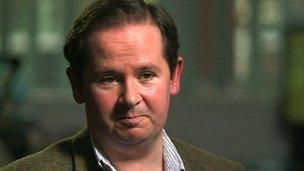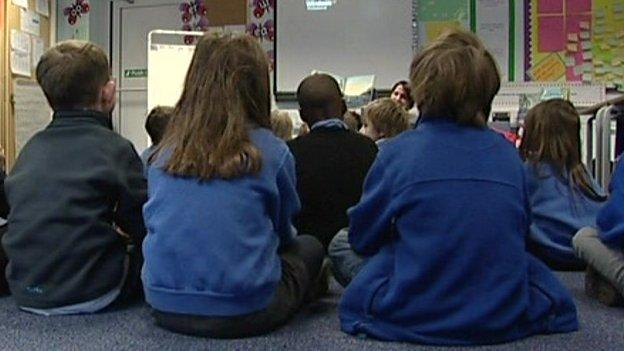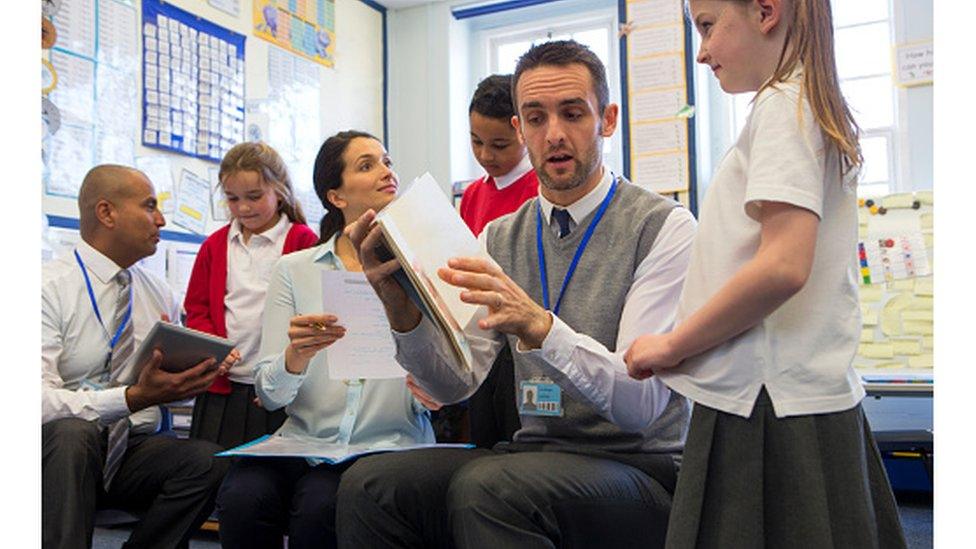LGA head: 'Government should reassess new free schools'
- Published
David Simmons says areas where there is a shortage of places should be the priority
The chair of the Local Government Association Children's Board has called for a review of the free schools approved to open in 2013 and beyond.
David Simmonds says many are in areas where there are surplus pupil places now and big population changes are not predicted in the near future.
The Department for Education rejected this, saying the schools are meeting demand for places where needed most.
The government has approved 112 free schools to open next year or later.
Speaking to BBC Newsnight, Mr Simmonds said: "What we'd like to see is government approving free schools primarily where that will meet the basic need in that local area, and then secondarily where it begins to create surplus places to add competition to local schools."
"Basic Need" is a term used to cover essential school places - needed to keep up with population growth.
The Department for Education (DfE) responded to the claim that many free schools are in areas with surplus places by saying "the LGA is wrong".
A spokesman told Newsnight: "Free schools are already meeting the demand for school places in areas where they are needed most. The vast majority of open mainstream free schools are in areas with the greatest pressure on places. And more than two-thirds of those planning to open from 2013 and beyond will also be in areas of basic need".
This is disputed. Francis Gilbert of the Local Schools Network, which opposes free schools, said that his research showed the majority of free schools were not in areas where significant numbers of new places were currently required.
Pressure on school places is especially acute in London where the population is approaching its historic high. The latest estimate from London councils is that an extra 90,000 school places will be needed by 2016.
Mr Simmonds said: "Where there is such a desperate shortage of school places in London and the South East, and across the UK, we should be spending the money there first and then looking at those areas where there is already maybe a ten, fifteen, twenty per cent surplus in school places for free schools afterwards."
His authority, Hillingdon, in north west London, is encouraging two new free schools. Because of a change in the law, it is much easier, quicker, and sometimes cheaper, for local authorities to support a free school than start their own.
The DfE said it had no plans to reassess its list of approved free schools.
Competition
The free school policy responds to local demand from parents. Where families are unhappy with the established schools, there are often spare places because parents choose to send their children elsewhere.

David Simmons says areas where there is a shortage of places should be the priority
In Runcorn, for example, 15% of places in secondary schools are currently surplus. A free school has just been opened there. Many of the pupils had completed a year in other secondary schools before their parents pulled them out.
Newsnight spoke to one such pupil, Rebecca Edwards, who after spending a year settling into secondary school did not want to move to the free school.
"I wouldn't even touch the blazer" she said.
But now she says she is happy at the free school, where she says she likes the smaller classes, the personal tuition and how pupils and staff interact.
"The teachers treat you like adults: if you respect them, they respect you back," she said.
Although the school began in September with only 19 pupils, it has doubled the roll in less than a term. Its head teacher Andrew Green Howard believes the school will reach 45 pupils early next year, the most it can accommodate in its current temporary classrooms.
The school has a site, and by 2014, thanks to capital funding from the DfE, it should have a brand new school which can accommodate up to 900 children.
As it succeeds, though, it will almost certainly have an impact on other schools.
Gerald Meehan, Strategic Director for children at the local authority, Halton, believes it could seriously undermine two local schools, which currently have below average GCSE results.
"Clearly we want every school in Halton to be a success," he said.
"But we also have a responsibility for the pupils who are attending our schools today, that their future education isn't threatened by their school not being viable or a large number of surplus places or money being removed from their budgets which otherwise would have gone to them."
- Published9 March 2015

- Published7 May 2016

- Published5 September 2011